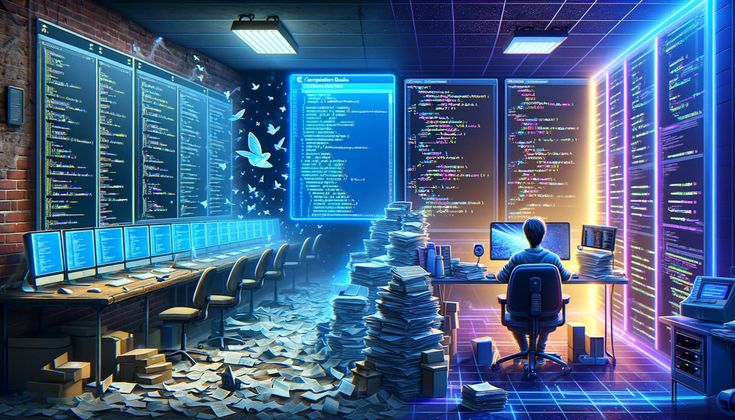Table of Contents
In April 2025, the National Security Commission on Emerging Biotechnology (NSCEB) released a comprehensive and urgent report that should be on the radar of every policymaker, business leader, and scientist concerned with the future of the United States’ technological and economic standing. The report outlines a chilling warning: China has emerged as a global leader in biotechnology, and if the United States does not act decisively in the next few years, it risks falling behind in a sector that is pivotal not only for global competition but also for national security.

China’s Dominance in Biotechnology: A Growing Concern
Biotechnology, an area that spans everything from pharmaceuticals to environmental solutions and military advancements, is rapidly evolving. The NSCEB’s report points out that China has made biotechnology a strategic priority for over 20 years. During this time, China has invested heavily in both research and development (R&D) and infrastructure, outspending the U.S. and advancing at an alarming pace.
The scale of China’s push is vast: from synthetic biology to biopharma research, China is not only scaling up its domestic biotech firms but also flooding the market with low-cost, high-demand biotech products, including the active ingredients for medications that make up nearly 90% of the U.S. market, such as ibuprofen and acetaminophen. Moreover, China’s government-backed approach—which combines state-led innovation, regulatory support, and massive capital investment—has enabled it to develop international partnerships, build biotech research parks, and create 17 industrial biotech clusters, giving it a dominant position in global supply chains.

America’s Current Biotechnology Landscape: Strengths but Declining Momentum
While the United States has traditionally been a global leader in biotechnology, with more patents, research institutions, and Nobel Prize winners than any other country, the U.S. biotech ecosystem is showing signs of strain. For years, U.S. funding for biotech has remained stagnant since the 1960s, while China has increased its biotech investments by more than 400 times in the past decade. Despite having some of the world’s most esteemed research institutions, the U.S. has failed to modernize its regulatory environment, making it harder to commercialize new technologies and slowing the growth of emerging biotech startups.
As China’s biotech capabilities continue to surge, the U.S. risks losing its competitive edge in a field with profound implications for healthcare, defense, agriculture, and energy. The NSCEB report urges the U.S. to recognize that we are on the brink of a biotech revolution that will redefine industries and shape national security, from AI-powered genetic engineering to bio-manufacturing of materials like munitions, chemicals, and rare earth metals.

The NSCEB’s Key Findings and Recommendations
The NSCEB’s report outlines several crucial steps the United States must take in the next three years to avoid falling irreparably behind. Here are the key findings and strategies recommended by the commission:
1. Prioritize Biotechnology at the National Level
One of the primary challenges identified is the lack of a unified, proactive strategy for biotechnology at the federal level. The NSCEB recommends the creation of a National Biotechnology Coordination Office within the Executive Office of the President to oversee and drive interagency efforts, ensuring that the U.S. government addresses this technology gap in a coordinated and strategic way. Moreover, the report advocates for the collection of timely, accurate data and the creation of predictive tools to help policymakers navigate this complex landscape and craft policies that position the U.S. as a global leader.
2. Mobilize the Private Sector and Scale U.S. Biotechnology
To capitalize on biotechnology opportunities, the U.S. must remove barriers to scaling innovative products. The commission calls for the simplification of regulations that hinder the commercialization of new biotech products. By creating initiatives like the Independence Investment Fund to help biotech startups scale up and establishing pre-commercial manufacturing facilities, the U.S. can stimulate the growth of homegrown biotech companies, ensuring the U.S. remains at the forefront of this critical field.
The commission also recommends incentivizing U.S.-based firms and limiting reliance on Chinese biotech suppliers, particularly those deemed a security threat. Ensuring transparency and bolstering domestic biotech infrastructure will reduce vulnerabilities in the supply chain.
3. Maximize the Benefits of Biotech for Defense
Biotechnology has significant applications in defense, from dynamic camouflage to bio-based energy solutions. The commission recommends that the U.S. define clear ethical guidelines for the application of biotechnology in defense. By supporting large-scale domestic biomanufacturing initiatives, the U.S. can enhance its military capabilities and reduce reliance on foreign sources for critical biotech materials.
4. Out-Innovate Strategic Competitors
To stay ahead, the U.S. must treat biological data as a strategic resource. The NSCEB calls for the Department of Energy (DOE) to create a “web of biological data” that can be accessed by researchers across the country. The United States must also block China from obtaining sensitive biological data and empower agencies like the Advanced Research Projects Agency for Health (ARPA-H) and Defense Advanced Research Projects Agency (DARPA) to lead the charge in biotechnology innovation.
5. Build the Biotechnology Workforce of the Future
A strong biotech workforce is critical to the U.S. maintaining a competitive edge. The report emphasizes the need for bioliteracy training at every level—from students to federal employees—ensuring that the next generation is equipped to lead the biotech revolution. Moreover, attracting foreign talent in biotech fields will help ensure that the U.S. stays at the cutting edge of biotech innovation.
6. Strengthen Global Alliances and Partnerships
Biotechnology is a global endeavor that requires international cooperation. The NSCEB stresses the importance of working with allies to set biosafety and biosecurity standards and form data-sharing agreements. A “promote and protect” strategy should guide the U.S.’s engagement with international players, including China when necessary, to safeguard the global biotech supply chain.

Concluding Thoughts: A Critical Three-Year Window
The NSCEB’s report makes one thing clear: the next three years will be pivotal for the United States in the field of biotechnology. China’s rise is not only a technological challenge but also a national security threat. The U.S. must act swiftly and decisively to harness the transformative power of biotechnology while addressing vulnerabilities in our domestic infrastructure and global supply chains.
As the commission highlights, a “ChatGPT moment” for biotechnology will come. If China dominates this revolution, the U.S. may find itself unable to catch up, no matter how hard it tries. To secure U.S. economic, technological, and military leadership, the federal government must invest at least $15 billion in biotechnology research, development, and innovation over the next five years.
In conclusion, the U.S. has the opportunity to lead a biotech revolution that will shape industries and national security for generations to come. With the right investments, policies, and global cooperation, the U.S. can ensure that it remains at the forefront of this critical field. Now is the time to act.
Author Profile
- Syed Tahir Abbas is a Master's student at Southwest University, Chongqing, specializing in international relations and sustainable development. His research focuses on U.S.-China diplomacy, global geopolitics, and the role of education in shaping international policies. Syed has contributed to academic discussions on political dynamics, economic growth, and sustainable energy, aiming to offer fresh insights into global affairs.
Latest entries
 U.S. Foreign PolicyFebruary 2, 2026AI and Grand Strategy: The Case for Restraint – Navigating the Future of American Power
U.S. Foreign PolicyFebruary 2, 2026AI and Grand Strategy: The Case for Restraint – Navigating the Future of American Power National SecurityJanuary 31, 2026Treating China’s Connected Energy Systems as a National Security Risk
National SecurityJanuary 31, 2026Treating China’s Connected Energy Systems as a National Security Risk Global HealthJanuary 29, 2026The Future of the WHO—and How the United States Can Shape It
Global HealthJanuary 29, 2026The Future of the WHO—and How the United States Can Shape It Global TradeJanuary 22, 2026Trump Cancels Tariffs on European Nations Over Greenland Pursuit?
Global TradeJanuary 22, 2026Trump Cancels Tariffs on European Nations Over Greenland Pursuit?


